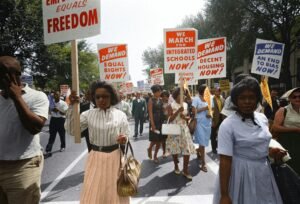Contemporary African American Writers
Contemporary African American literature represents a vibrant and dynamic field that reflects the complexities of modern society through the lens of African American experiences. Contemporary African American writers contribute a diverse array of voices, styles, and themes, weaving a rich tapestry of narratives that resonate with readers both within and beyond the African American community. Broadly defined, contemporary literature refers to works produced from the late 20th century to the present, marked by a departure from traditional forms and an embrace of innovative storytelling techniques. The significance of contemporary African American writers lies not only in their artistic merit but also in their ability to address pressing social issues, challenge prevailing narratives, and elevate underrepresented voices. Their work serves as a critical platform for exploring themes of identity, race, and culture, offering profound insight into the ongoing struggle for equality and justice. As these writers navigate the complexities of their heritage and contemporary society, they offer powerful reflections on personal and collective experiences, making their works essential to understanding the broader American narrative. To appreciate the contributions of contemporary African American writers fully, it is crucial to consider their historical context. The evolution of African American writing can be traced back to the early 19th century, with the emergence of slave narratives and abolitionist literature. Over the decades, African American writers have employed their craft to articulate the Black experience in America, responding to the socio-political climate of their times. From the Harlem Renaissance to the Civil Rights Movement and beyond, each era has influenced the themes and styles of African American literature, paving the way for today’s literary voices.
Contemporary African American writers tackle key themes that reflect the complexities of modern life, including identity and intersectionality, the impact of systemic racism, and the quest for belonging in an increasingly globalized world. Additionally, their works frequently engage with the role of technology and social media in shaping narratives. As we delve deeper into this literary landscape, we will explore prominent contemporary African American writers, the themes they address, and the unique styles that define their work.
To appreciate the contributions of contemporary African American writers fully, it is crucial to consider their historical context. The evolution of African American writing can be traced back to the early 19th century, with the emergence of slave narratives and abolitionist literature. Over the decades, African American writers have employed their craft to articulate the Black experience in America, responding to the socio-political climate of their times. From the Harlem Renaissance to the Civil Rights Movement and beyond, each era has influenced the themes and styles of African American literature, paving the way for today’s literary voices.
Contemporary African American writers tackle key themes that reflect the complexities of modern life, including identity and intersectionality, the impact of systemic racism, and the quest for belonging in an increasingly globalized world. Additionally, their works frequently engage with the role of technology and social media in shaping narratives. As we delve deeper into this literary landscape, we will explore prominent contemporary African American writers, the themes they address, and the unique styles that define their work.
Prominent Contemporary African American Writers
The contemporary African American literary landscape is vibrant and diverse, marked by voices that address complex social issues and personal narratives. Several writers stand out for their significant contributions to cultural discourse and their ability to engage with pressing themes of identity, race, and history. Ta-Nehisi Coates and His Cultural Impact Ta-Nehisi Coates is one of the most influential contemporary African American writers. His works, including *Between the World and Me* and *The Water Dancer*, deeply explore the African American experience, examining intersections of race, history, and personal identity. Coates combines personal narrative with social commentary to confront systemic racism and the enduring legacies of slavery, sparking critical conversations about justice and equity in America. Colson Whitehead’s Innovative Narratives Colson Whitehead has redefined contemporary African American literature with his masterful blending of history and fiction. In *The Underground Railroad* and *The Nickel Boys*, he offers poignant reimaginings of historical events, creating narratives that delve into the horrors of slavery and institutional racism. Whitehead’s ability to merge historical accuracy with inventive storytelling challenges readers to confront uncomfortable truths about America’s past and its lasting impact. Jesmyn Ward’s Poignant Stories
Jesmyn Ward’s work explores themes of poverty, racism, and resilience in the rural South. Her novels, including *Salvage the Bones* and *Sing, Unburied, Sing*, illuminate the struggles of African American communities through rich, lyrical prose. Ward’s focus on familial bonds and intergenerational trauma provides a deeply human perspective on systemic issues.
These contemporary African American writers exemplify the richness and diversity of modern African American literature. Their works not only elevate marginalized voices but also redefine the boundaries of storytelling, making significant contributions to both literature and cultural dialogue.
Jesmyn Ward’s Poignant Stories
Jesmyn Ward’s work explores themes of poverty, racism, and resilience in the rural South. Her novels, including *Salvage the Bones* and *Sing, Unburied, Sing*, illuminate the struggles of African American communities through rich, lyrical prose. Ward’s focus on familial bonds and intergenerational trauma provides a deeply human perspective on systemic issues.
These contemporary African American writers exemplify the richness and diversity of modern African American literature. Their works not only elevate marginalized voices but also redefine the boundaries of storytelling, making significant contributions to both literature and cultural dialogue.
Themes and Styles in Contemporary African American Literature
The works of contemporary African American writers are characterized by an exploration of identity, social justice, and the interplay of technology and communication. Identity and Intersectionality Contemporary African American writers often delve into the complexities of personal and collective identity. They explore how race intersects with gender, class, and sexuality, providing nuanced portrayals of Black lives. This theme underscores the multiplicity of African American experiences, highlighting the richness of cultural and individual identities. Social Justice and Activism Social justice remains a cornerstone of contemporary African American literature. Authors use their works to address systemic inequities, inspire activism, and document the ongoing fight for civil rights. Works like Angie Thomas’s *The Hate U Give* showcase the power of literature as a catalyst for change, bringing critical issues like police brutality into public discourse. Technology and Modern Communication Contemporary African American writers incorporate the digital age into their narratives, reflecting on how technology shapes identity and interaction. The role of social media, online activism, and digital storytelling offers new dimensions to traditional themes, connecting past struggles to modern tools of resistance and expression.The Future of African American Literature
The contributions of contemporary African American writers ensure the continued evolution of this literary tradition. With emerging voices such as Kiley Reid and Jason Reynolds pushing boundaries and exploring new formats, the future of African American literature is poised to remain dynamic and impactful. These writers challenge norms, amplify diverse perspectives, and inspire critical conversations, ensuring their stories resonate across generations and cultures.
FAQs About Contemporary African American Writers
1. Who are some prominent contemporary African American writers? Notable figures include Ta-Nehisi Coates, Colson Whitehead, Jesmyn Ward, Angie Thomas, and Jacqueline Woodson. 2. What themes do contemporary African American writers commonly explore? They often explore identity, systemic racism, intersectionality, resilience, social justice, and the influence of technology on culture and communication. 3. Why is Ta-Nehisi Coates considered influential in contemporary literature? Coates is renowned for addressing systemic racism and the legacy of slavery in works like Between the World and Me and The Water Dancer, blending personal narrative with social commentary. 4. What makes Jesmyn Ward’s work significant? Jesmyn Ward’s novels highlight the struggles of African American communities in the rural South, focusing on themes of resilience, family, and intergenerational trauma. 5. How does Colson Whitehead use history in his writing? Whitehead reimagines historical events with innovative storytelling, as seen in The Underground Railroad and The Nickel Boys, shedding light on slavery and institutional racism. 6. What role does social justice play in contemporary African American literature? Social justice is a central theme, with writers using their platforms to address inequities and advocate for systemic change, often inspiring activism through their narratives. 7. How has Angie Thomas influenced young adult literature? Thomas’s The Hate U Give tackles police brutality and systemic racism, providing a powerful voice for young readers and promoting awareness of social issues. 8. How do contemporary African American writers incorporate intersectionality? They address how overlapping aspects of identity—such as race, gender, class, and sexuality—shape individual and collective experiences, offering nuanced portrayals of African American life. 9. What impact has technology had on contemporary African American literature? Many writers incorporate themes of social media, digital activism, and online communication, reflecting the modern digital landscape in their storytelling. 10. What genres are contemporary African American writers exploring? They write across diverse genres, including literary fiction, young adult fiction, historical fiction, memoir, and speculative fiction. 11. How do contemporary African American writers connect to historical literary traditions? They build on the legacy of past African American literature, drawing from movements like the Harlem Renaissance and the Civil Rights era while addressing modern issues. 12. Who are some emerging contemporary African American writers to watch? Emerging voices include Kiley Reid, Jason Reynolds, and Brit Bennett, who are redefining storytelling with fresh perspectives and innovative approaches. 13. What is the role of memoir in contemporary African American literature? Memoirs like Ta-Nehisi Coates’s Between the World and Me provide deeply personal insights into race and identity while addressing broader societal themes. 14. Why is representation important in contemporary African American literature? Representation ensures diverse voices and experiences are acknowledged, fostering empathy and understanding while challenging stereotypes. 15. What is the future of contemporary African American literature? With new voices and evolving themes, the future is dynamic, focusing on innovation, inclusivity, and continued advocacy for social and cultural transformation.https://howtoplaythedjembedrums.com/contemporary-african-american-writers/



